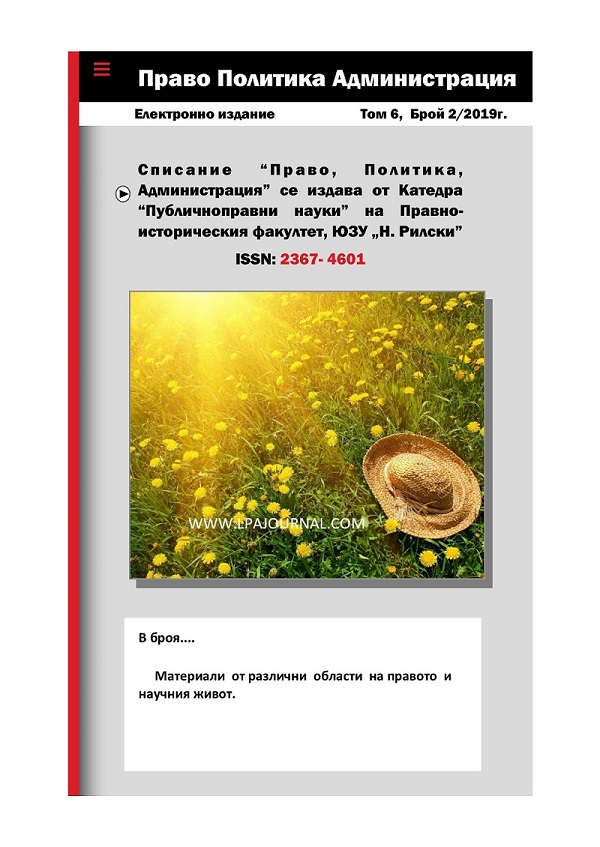
We kindly inform you that, as long as the subject affiliation of our 300.000+ articles is in progress, you might get unsufficient or no results on your third level or second level search. In this case, please broaden your search criteria.

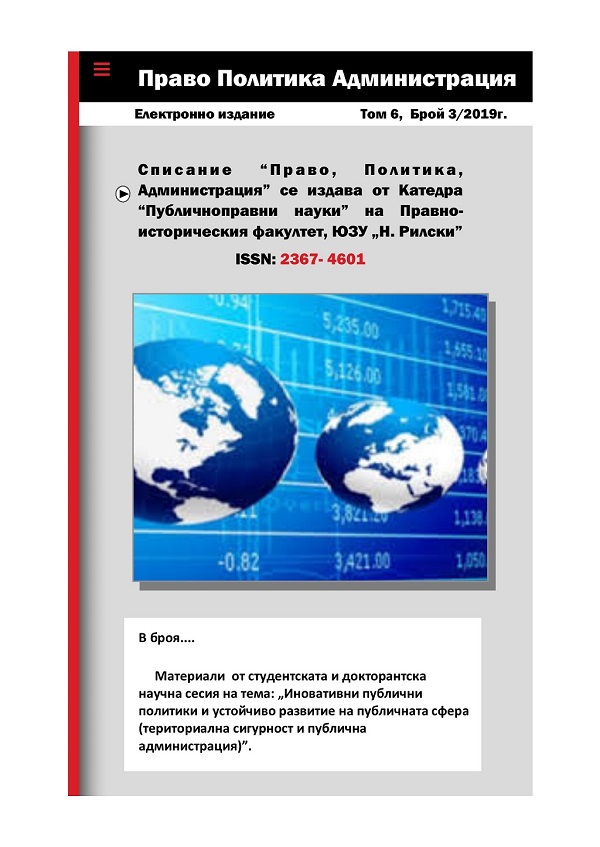
This article discusses whether the term preference share may exist in a limited liability company. It explores some possible deviations from the legislative provisions by setting up privileges for certain partners, without infringing the fundamental principle for equality. In order to justify their statements, the authors apply comparative law methods using for basis the Bulgarian, Hungarian, German and Russian law. They point out relevant examples from the case law of the Supreme Court of Cassation
More...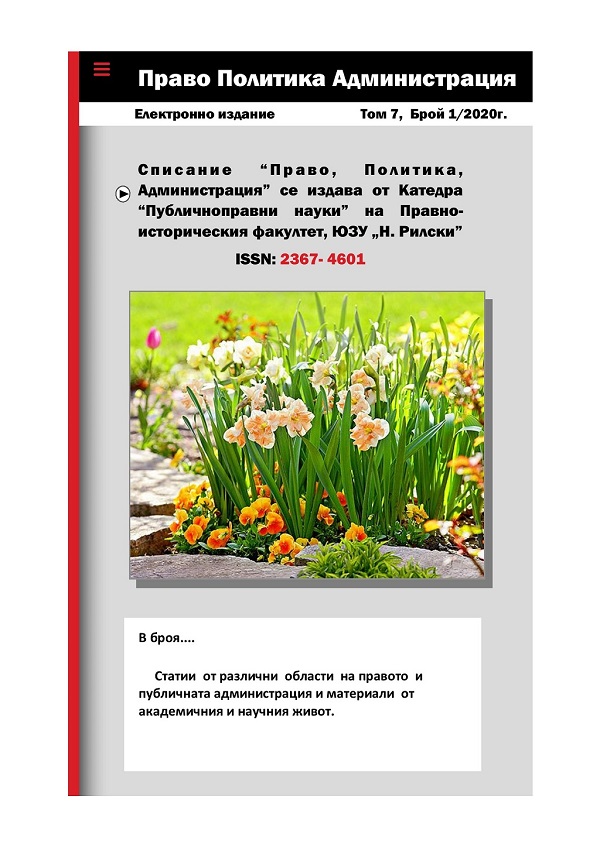
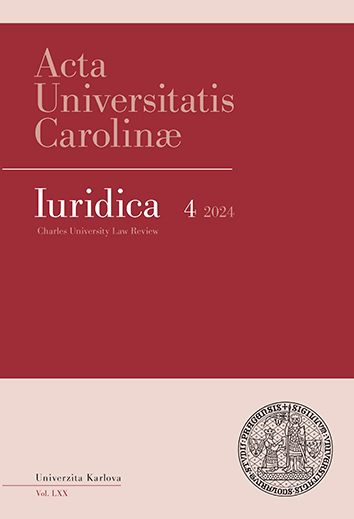
The theory of artifacts can be understood as primarily focusing on function when counting something as an artifact. With that starting point, projects aimed at the identification of the function of law contribute to arguments about categorizing law as an artifact. The purpose of this study is to highlight the challenges of this endeavor. Before beginning with search for law-functions, questions about the postulates on the relations between an artifact, law, and function (axiomatic stage) have to be addressed and the proper methodological approach must be found which is capable of addressing the contingency problem (methodological stage).
More...
The paper deals with the problem of conflicts between fundamental rights by presenting and analysing one of the possible methods for the resolution of such conflicts. The method in question is the so-called interpretative-subsumptive method, developed by Spanish legal philosopher Juan Antonio García Amado. The interpretative-subsumptive method represents an alternative to the mainstream method used for the resolution of conflicts between fundamental rights – judicial balancing, and particularly the version developed by Robert Alexy. After the introduction, interpretative-subsumptive method is contextualised by presenting Garcia Amado’s ideas which are of relevance for the inquiry – his inclusive legal positivist views, the theory of legal interpretation he ascribes to and his understanding and typology of fundamental rights and their conflicts. After that, in the central section of the paper, the theoretical framework of the interpretative-subsumptive method is presented, along with its application to a Spanish Supreme Court case, followed by the criticism that has been raised and ending with conclusions.
More...
The aim of this paper is to answer the question of why we need an unlawful state of affairs as a ground for legal liability. At its core is a polemic with Filip Melzer’s view that “a certain state of affairs cannot, strictly speaking, be described as unlawful in itself, but only the conduct of the legal subject that led to that consequence or state of affairs”. Its starting point is not “strict liability”, as we understood it until the adoption of the Civil Code in 2012, but the German concept of liability for endangerment (Gefährdungshaftung), which is based not on an unlawful condition but on liability for an increase in risk. For these reasons, I will first address the question of how liability for damages, as we have known and understood it under the 1964 Civil Code, differs from the obligation to compensate for damages, which is enshrined in the current and effective Civil Code. I then consider why we need “unlawfulness” (wrongfulness) to distinguish an unfortunate coincidence from an unlawful state of affairs, and why we do not merely distinguish legal events from unlawful states of affairs. Finally, I consider the concept of liability for endangerment (Gefährdungshaftung) itself and its weaknesses.
More...
This article discusses the controversial pay or okay business model and examines its legal prerequisites and implications when used on online platforms within the European legislative environment. The analysis begins with a review of a decision by the Court of Justice of the European Union, which deemed this model legal, followed by exploration of its theoretical and practical problematic aspects. Criticism of the model primarily focuses on freely given consent and the pricing of the “pay” option. Consequently, the European Data Protection Board and certain national authorities have formulated positions and outlined criteria to consider when contemplating the implementation of the pay or okay business model.
More...
This article deals with some issues of legal regulation of the association of unit owners as a legal entity in the legal system of the Czech Republic. Due to the complexity and extensiveness of the legal regulation of this issue, only some selected aspects of the legal regulation are discussed here, namely the extent of the legal personality of the association of unit owners, as well as some issues directly related to it.
More...
Land disputes are one of the most common cases in Indonesia. It is due to the demand for land ownership rights. In this case, mediation is used to resolve the case. The non-judicial mediator is a neutral party who helps the parties fairly. This study examines the civil law liabilities of non-judicial mediators in land ownership disputes and the legal position of a non-judicial mediator on authentic peace deeds. This research applied a juridical-normative approach with a law and a conceptual approach. The results indicated that non-judicial mediators, in carrying out their primary duties, both in terms of rights and obligations, must be based on law and protected by law to optimally provide services to the community while having a clear legal position in the notary. To sum up, unifying the mediation arrangement in one statutory regulation and mediation in the realm is necessary, both in litigation and non-litigation. In addition, future research can investigate the effectiveness and implementation of mediation certification, secrecy, financing, and repetition of mediation in land dispute cases. Further exploration is needed to understand the impact of mediation on the autonomy of the parties involved in land ownership disputes.
More...
The Czech-Croatian Colloquium in Legal Theory held on May 24, 2024, at the Faculty of Law, Charles University, organized by the Czech Association for Legal and Social Philosophy, the event marked the beginning of collaboration between Czech and Croatian academic institutions in legal theory. The colloquium featured four thematic blocks: Law and Responsibility, Application of Law, Legal Argumentation and Doctrinal Research, Functions and Challenges of Law, and Human Rights and Balancing. Contributions included discussions on group rights, liability in Czech private law, errors in judicial application of law, and the effectiveness of law. The event also addressed the fragmentation of law, legal personhood, and the impact of the COVID-19 pandemic on constitutional imperatives. The colloquium concluded with a critique of natural rights and a call for future academic cooperation between the two countries.
More...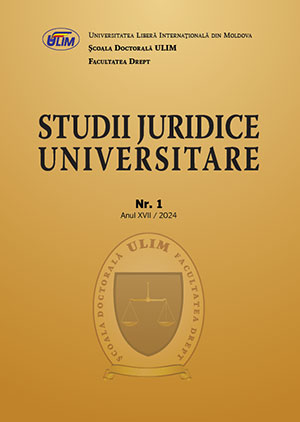
The international normative framework is very complex and covers a wide range of aspects in guaranteeing international security, which also affects national security. However, it does not eliminate or mitigate all security challenges, threats and risks. In this sense, it is necessary to analyze both the historical evolution and the essence and forms of international economic sanctions that aim to ensure compliance with the norms of public international law and affect not only the targeted state but also the economic security of its population. We can find a great diversity of definitions of economic sanctions, but the overwhelming majority of authors recognize their direct impact on the economic security of the affected state. This article reflects the classic and modern trends in defining the essence and concept of economic sanctions in public international law in the light of the imperative to ensure national security.
More...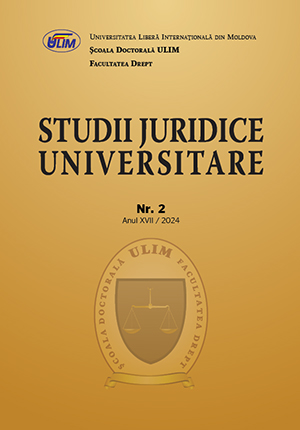
Regulation of political party funding and asset management is essential to maintain integrity and transparency in the political process. This fact is essential to persist in a rule of law and democracy. In the context of this scientific approach, we propose to highlight some aspects of essential importance regarding the status and type of patrimony of political parties, as well as the legal basis and the way of financing political parties.
More...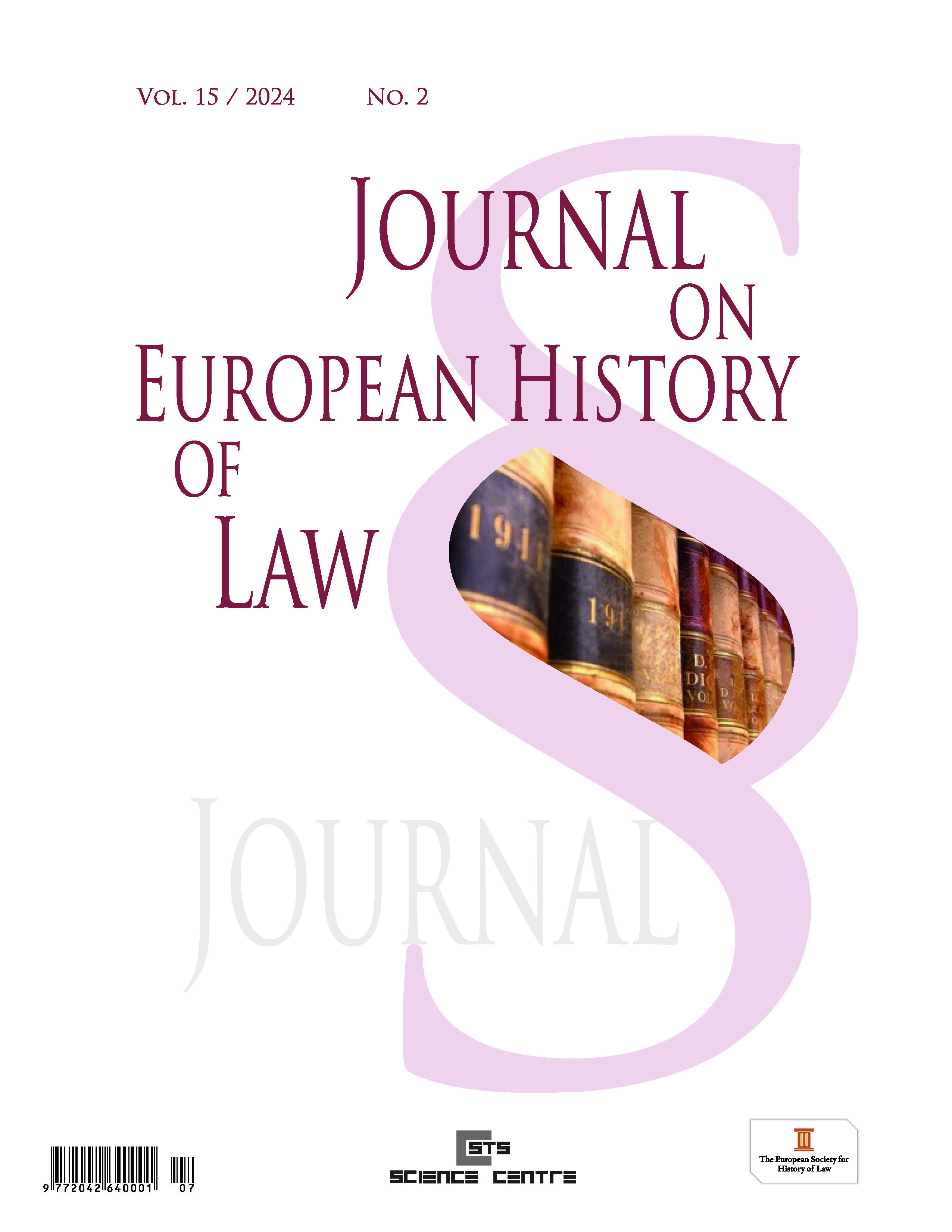
This paper focuses on the legal aspects of Cicero’s oration on behalf of Tullius, especially the actio de vi coactis armatisve hominibus, an action that receives comparatively little attention in the scientific debate. It will be shown, inter alia, that Cicero’s interpretation of the action is probably “correct”.
More...
The aim of this paper is to analyse who could become a notary in the Basque territory of Biscay between the sixteenth and eighteenth centuries. I will therefore begin by analysing the requirements for becoming a notary, followed by the training process and the examination to obtain the notary title. Finally, the linguistic skills of the notaries will be examined, as they also translated into Basque and Spanish. The paper is based on the laws and regulations of the time in the Castilian and Basque territories, as well as on documents from the archives that provide concrete examples.
More...
The bankruptcy proceedings codified in the Bavarian Code of Civil Procedure immediately before the founding of the German Empire after long scientific and political discussion (Gant) competed as the most up-to-date regulation of the bankruptcy proceedings in a German individual state with the regulatory concepts of the Prussian Bankruptcy Code of 1855, which was significantly influenced by French law, for influence on the Reich Bankruptcy Code of 1877. It is therefore necessary to examine what impetus the Bavarian law was able to provide, which will be done using the example of the problem of selecting the bankruptcy trustee which is a crucial question in bankruptcy proceedings.
More...
One of the most important tasks of Polish civil sciences after the end of World War II was the issue of adapting the state of civil law to the economic and propaganda requirements of the time. Civil law was supposed to respond to the economic and, above all, political conditions of the new, socialist reality. It was decided to quickly unify the most important areas of law (personal law, matrimonial law, family law, guardianship law, matrimonial property law, inheritance law, property law) to make room for later codification. The article concerns some problems related to the codification of civil law, including the discussion of Polish doctrine in this area. These discussions took place in the legal press, as well as at frequently organized scientific conferences. Ideological and substantive arguments were then raised to justify the quickest possible regulation of civil law. However, the most important discussions took place in the Codification Commission established in 1956, where the Substantive Civil Law Team was established, whose task was to create a draft of the new Civil Code. Substantive arguments clearly dominated the discussions on the shape of individual legal institutions held at the team's meetings. The team's work resulted in the adoption of the Civil Code in 1964, which is currently still in force in Poland.
More...
God’s kingship is based on two important spiritual realities: the justice and legality. The Jewish legal practice in Jesus’ day rested on the Mosaic Law and its rabbinic interpretation. The Torah established a powerful court-system, which interweaved through the whole of society in ancient Israel; and at a later stage, the high priest and the president of the court surrounded themselves with a seventy-strong advisory council, which partly consisted of priests, partly of judges with the highest authority nationwide, and partly of the wise. This Supreme Court (which later called Sanhedrin) was the court of appeal of highest authority, which made decisions in cases not settled by the courts on lower grades. This paper, in addition to the above judicial bodies, also examines the basic rules of investigating the cases, the presence or absence of wilfulness, as well as the Rabbinic regulations concerning testimonies of witnesses.
More...
Although fruit spirits are brewed all over the world, based on the decision of the European Union, the name “palinka” nowadays can only be used by Hungary and four Austrian provinces for those apricot spirits that comply with the protection of origin. The Hungarian expression palinka borrowed from the Slovakian word “palenka”, has been used since the 17th century, and originally not exclusively for fruit distillates. The first detailed and central regulation for such distillates in Hungary was Act No VI of 1836. This study presents the legal history of palinka from the first detailed law until the 1919 Prohibition promulgated by the Socialist Federative Republic of Councils in Hungary. The research was primarily based on the analysis of Hungarian legal sources regarding the production, consumption, taxation, export and import of spirits, based on the Corpus Juris Hungarici, during the period under review.
More...
The study highlights the provisions of the third chapter "On the Rights of Spouses" of the first part "On Personal Law" of the Josephine Code of 1787, which regulated marital relations in the Habsburg monarchy. First of all, the author analyzes the condition of scientific research of the set problem as a whole in the European science of the history of law since the end of the 18th – beginning of the 19th century and up to the present, as well as in the Ukrainian science. The author reveales the prerequisites of compiling the Josephine Code and considers the peculiarities of the codification work on it. The main focus of the study is based on the characteristics of marriage law according to the Josephine Code and the identification of the reception of the Roman law in its provisions, while for the first time, the meaning of the Marriage Patent of January 16, 1783, is clarified. Therefore, the author researches the conditions and procedure of concluding a marriage, including the conditions and legal consequences of recognition a marriage to be invalid; the grounds, conditions and procedure for dissolution of marriage, including the mode of separate residence of the spouses (so-called separation from board and bed). In conclusion, the author substantiates the historical and legal significance of the Josephine Code.
More...
The subject of the present study is to examine and analyse the labour remuneration of the mayor of the municipality as its essence, elements, and method of determination, in order to clarify the nature of the legal relationship under which he works. The analysis of the current legislation and existing judicial practice is based on the conclusion of the unique nature of the legal relationship and the inadmissibility of equating it to employmen.
More...